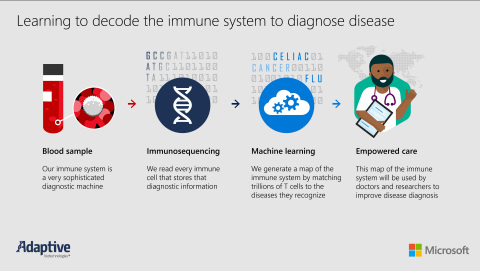Adaptive Biotechnologies announced today their partnership with Microsoft to map the genetics of the human immune system, or immunome, in order to detect cancers and other diseases in their earliest stage, when they can be more effectively treated.
Partnership to be featured at Annual J.P. Morgan Healthcare Conference
SEATTLE--(BUSINESS WIRE)-- Adaptive Biotechnologies, a leader in next-generation sequencing (NGS) of T- and B-cell receptors of the adaptive immune system, announced today their partnership with Microsoft to map the genetics of the human immune system, or immunome, in order to detect cancers and other diseases in their earliest stage, when they can be more effectively treated. By combining Adaptive’s powerful immune sequencing technologies with Microsoft’s research and large-scale machine learning and cloud computing capabilities, the partners aim to create individual disease diagnostics and ultimately a universal diagnostic – all from a simple blood test. Under terms of the partnership, Microsoft has made a financial investment into Adaptive, in addition to bringing research and large-scale machine learning and cloud computing capabilities to the endeavor.
This press release features multimedia. View the full release here: http://www.businesswire.com/news/home/20180104005464/en/

. This infographic outlines the process for learning to decode the human immune system to diagnose disease. (Graphic: Business Wire)
The immune system is nature’s most finely-tuned diagnostic as it routinely scans and reads any signal of disease – such as a cancer cell or an infectious agent – in the body, and holds the genetic code that can give insights into detecting these diseases. Adaptive and Microsoft are partnering to translate this genetic code into simple blood-based diagnostics that are broadly accessible to people around the world.
“This announcement comes at a time of inflection in healthcare and biotechnology. We now have the technology to be able to do what we’ve been talking about for the past decade – develop a universal TCR antigen map that presents an opportunity to help patients at an unprecedented scale,” said Chad Robins, President, CEO and Co-Founder of Adaptive Biotechnologies. “Some conditions like cancer or autoimmune disorders can be difficult to diagnose, but this universal map of the immune system will enable earlier and more accurate diagnosis of disease, potentially helping physicians to connect the dots to understand the relationship between disease states and eventually lead to a better understanding of overall human health.”
This collaboration is a cornerstone of Microsoft’s Healthcare NExT initiative, and a first partnership between a leading genomics and technology company to map the genetics of the immune system. The Microsoft Healthcare NExT initiative was launched last year to maximize the ability of artificial intelligence and cloud computing to accelerate innovation in the healthcare industry, advance science through technology, and turn the lifesaving potential of next discoveries into reality.
“We are very excited and inspired by our collaboration with Adaptive Biotechnologies, as it clearly advances our mission to use cloud and AI technologies to transform healthcare and improve the lives of people around the world,” said Peter Lee, Corporate Vice President, AI and Research, Microsoft. “This collaboration combines powerful sequencing and AI technologies into a revolutionary new capability, and represents the kind of deep collaborative partnership that we live for. We are incredibly proud to bring our best people and AI capabilities together with Adaptive in this joint quest.”
The partnership will be discussed in greater detail at the 36th Annual J.P. Morgan Healthcare Conference in San Francisco at a fireside chat with Chad Robins, Adaptive CEO, and Peter Lee, Corporate VP, Microsoft AI and Research, on Wednesday, January 10 at 5:00 pm PT.
About the T-Cell Receptor (TCR) - Antigen Map
The TCR Antigen Map consists of proprietary computational models using immune sequencing and machine learning that will allow us to decode the genetics of the immune system to detect most diseases earlier and more accurately. The T-cell receptor (TCR) is a receptor expressed on the surface of a T cell, a type of white blood cell; it is genetically encoded to recognize signals of disease, called antigens. By mapping TCR sequences to the antigens they bind, we will endeavor to mirror the natural diagnostic capability of the immune system in the clinic with individual disease diagnostics – and ultimately, a universal diagnostic – all from a simple blood test.
About Adaptive Biotechnologies®
Adaptive Biotechnologies is a pioneer and leader in combining high-throughput sequencing and expert bioinformatics to profile T-cell and B-cell receptors. Adaptive is bringing the accuracy and sensitivity of its immunosequencing platform into laboratories around the world to drive groundbreaking research in cancer and other immune-mediated diseases. Adaptive’s mission is to translate immunosequencing discoveries into clinical diagnostics and therapeutics to improve patient care. For more information, please visit adaptivebiotech.com.
View source version on businesswire.com: http://www.businesswire.com/news/home/20180104005464/en/
Source: Adaptive Biotechnologies







